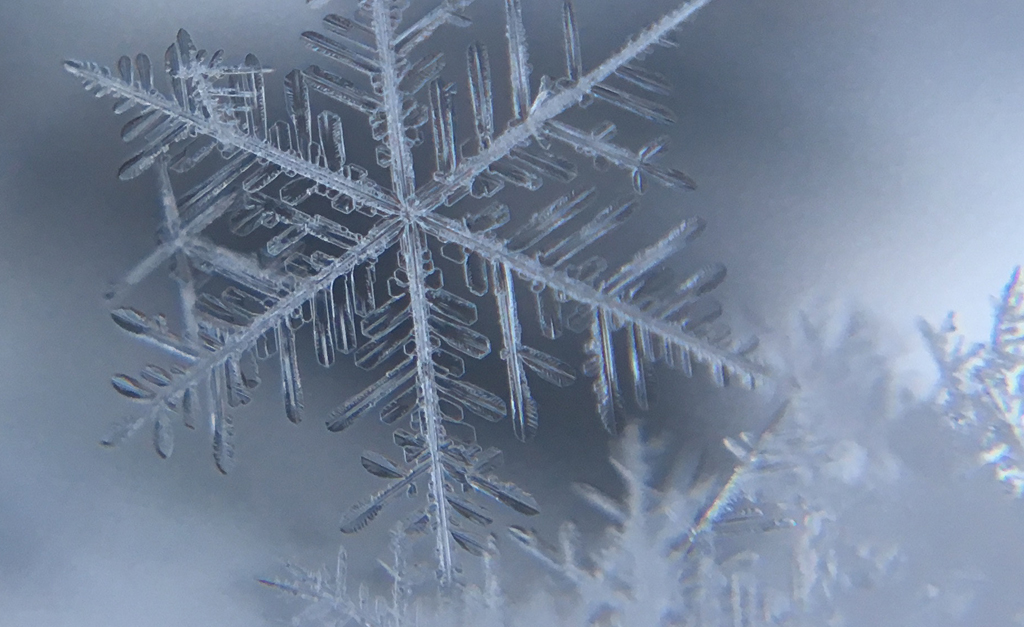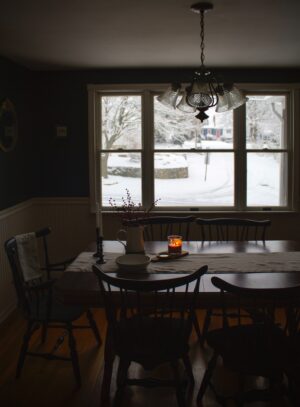
Snow, ice, and a little peace of mind.
Snow and ice are in the forecast for us (again). If you’re off to grab a few provisions, don’t forget to build in a little time to make sure your heat pump is ready for snow. A few simple steps can go a long way in ensuring you stay comfortable and safe during the snow and ice.
An important step before the snow.
One important preventative measure is to clear debris from around your outdoor heat pump before the snow starts. Make sure you observe a two-foot clearance around—and above—your unit. Trim any low hanging tree or bush limbs to keep debris from falling onto your unit due to snow and ice build up. You can also erect a canopy for shelter—keeping that two-foot clearance in mind. A shelter is also a good way to keep your heat pump more efficient in the summer too, by providing ample shade.
An essential step during the snow.
During the snow, it’s essential to keep snow and ice from building up around your unit. To melt ice, you can use warm water, but never use boiling water and never use water to melt ice if the temperatures are below freezing. Plus, keep an eye on your condenser. If the compressor is on, you should be able to hear it and see the fan blades turning. If it’s not turning, check the breaker, thermostat, or look for debris that may be causing an obstruction.
Always…
Schedule spring and fall routine maintenance check-ups with your trusted HVAC technicians so that winter weather finds you prepared—to have a comfy snow day.
3 Myths About Home Cooling
Here in Central Virginia, spring is in full swing! You’ve probably either switched from heating to cooling or cut off your system entirely, so it’s a great time to evaluate the health of your home comfort systems as they wind down from winter and prepare for warm days ahead. Here are three AC myths to
Read MorePlanning a Home Renovation? Here’s Your Comprehensive HVAC, Plumbing, and Electrical To-Do List
If you’re embarking on a home renovation project, it’s crucial to make sure you have a comprehensive plan for your HVAC, electrical, and plumbing systems. This part of the renovation process may not be as glamorous as choosing new flooring or fresh paint colors, but these systems will keep you safe and comfortable for years
Read MoreHow to Fix a Running Toilet…And Why You Should Address It Immediately!
If you’re reading this, you’re probably either standing in front of a noisy, constantly running toilet, or you’re curious how to avoid this homeowner headache. A running toilet is an expensive maintenance task to leave on the back burner. You can waste up to 200 gallons of water a day, depending on the age and
Read MoreWinter Heating Tips: How to Stay Warm Without Breaking the Bank
There are a few months of winter ahead of us here in Charlottesville, so keeping our homes warm and comfortable is a top priority. Here are some tips on how you can keep it cozy without just cranking up the heat and paying for it when the energy bill arrives. We’ve said it before, and
Read MoreTwo Easy Ways to Improve Indoor Air Quality this Winter
As the weather gets colder and days get shorter, your family is likely spending a little more time indoors. It’s important to ensure the air circulating in your home is as healthy and dust-free as possible! Even when it’s too cold to open a window, there are some ways to proactively protect your indoor air
Read More3 Signs Your Heating System Needs to be Checked
Are you receiving high electric bills or noticing strange noises or smells from your heating system? When our customers call us and mention warning signs like this, we recommend a service check immediately! Bad Smells Strong, foul odors are a common warning sign of a heating system that needs attention. The bad smells could be
Read More5 Signs You Need to Call A Plumber
Most people only call a plumber in crisis mode or when installing new fixtures. However, there are some common signs of wear and tear that shouldn’t be overlooked! #1: Slow Drains and Persistent Clogs Do you have a stubborn drain that always holds water? This is likely due to hair, grease, debris, or other debris
Read MoreCozy and Cost-Effective: A Checklist to Help Prepare Your Home for Fall Heating Savings
Here in Central Virginia, fall is quickly approaching! While the fall season brings many fun activities and autumn treats to look forward to, it also means dropping temperatures and rising heating bills. We’ve gathered our best tips for preparing your home for the fall and winter seasons to help you be as energy-efficient as possible!
Read MoreElectrical Safety 101: Essential Tips for Homeowners
As a homeowner, you want to feel safe and equipped to fix common, simple issues. However, when it comes to electrical, many of us don’t know much except where the breaker box is located. If you don’t know where your panel is…this is your sign to go find it! Breaker boxes are often located in
Read More10 Indoor Air Quality Tips for the Summer
Maintaining a healthy and comfortable indoor environment is essential year-round. However, we’ve found that managing indoor air quality can be trickier in the summer when you’re less likely to bring in fresh air through open windows. Here are 10 tips that will help you optimize your HVAC system’s performance, control humidity levels, and minimize indoor
Read MoreHow to Program Your Thermostat for Optimal Comfort AND Efficiency
Each year, more homeowners make the switch to programmable thermostats. Why? Because these devices can make it easier to stay comfortable and use your HVAC system as efficiently as possible. Here’s how we advise our customers to strike a balance of comfort and energy efficiency: Make a Small Temperature Change The Google Nest team recommends
Read MoreWhat’s Really Better? Central Air Conditioning or a Ductless System?
Are you building a home or adding an HVAC system to your existing home? You’ll need to choose either central air conditioning or a ductless system. While there are pros and cons to both systems, the choice depends on your needs, preferences, and budget. Cost Considerations Since ductless systems are less expensive and less complicated
Read MoreWays to Reduce Allergens and Improve Your Home’s Indoor Air Quality
Does your family struggle seasonally or year-round with allergies, asthma, or other respiratory difficulties? It may be time to think about ways to improve your indoor air quality. Deep Clean to Get Rid of Potential Allergens To help alleviate allergy symptoms, it’s best to eliminate dust mites and pet dander from your home by cleaning
Read More5 Home Maintenance Tasks You Should Never Neglect
When life gets busy, it’s easy to forget or ignore routine home maintenance tasks. However, identifying minor problems can keep issues from turning into major, expensive repairs. Here are five home maintenance tasks you should never overlook: Fix leaky faucets: Fixing leaks is about more than just saving water and avoiding flooring or wall damage.
Read MoreIntroducing the 2023 W.E. Give Back Program
W.E. Brown has thrived in the Charlottesville area since 1922 and every year, we try to find ways to give back to this amazing community where our customers live. This year, we’re partnering with our friends at NBC29 to host the W.E. Give Back Program. The goal of this program is to recognize and give
Read More3 Reasons to Consider Buying a Generator this Winter
During the cold winter months, owning a generator can bring peace of mind. Being without power in frigid weather can be inconvenient and even dangerous. Here at W.E. Brown, we believe that investing in a generator is a step you can take to ensure that your family stays safe and that you don’t have to
Read MoreTroubleshoot a Tripped Circuit Breaker.
When a breaker trips in your home, it’s due to overcapacity or a short: The breaker trips, stopping the flow of electricity as a safety measure. A tripped main breaker will cut the power off to your entire house. SOME COMMON CAUSES CAN INCLUDE: too many appliances; appliances that require too much electricity; damaged breakers;
Read MoreTroubleshoot uneven heating.
Routine maintenance makes sure your heat pump is working at peak performance. But if one room is typically colder than the rest of your home, here are a few DIY tips you can do to help. Test your thermostat. Affix a thermometer on your wall next to your thermostat. Place a towel behind the thermometer
Read MoreTroubleshoot a clogged toilet.
To ensure that your toilet doesn’t overflow, remove the lid from the toilet tank and close the rubber flapper—unless you have a pressure-assisted tank. You may also reach behind the toilet and turn off the water supply. (Make sure you turn the supply back on when you’re ready to flush again.) PLUNGER Grab a heavy-duty
Read MoreWhat is emergency heat?
What is emergency heat—and why do I need it? As a follow-up to our recent blog “My A/C won’t keep my house cool enough on a 95-degree day,” we’re taking a look at how heat pumps use emergency heat to perform adequately during the winter. Emergency or auxiliary heat is a supplemental heating component installed
Read More



















